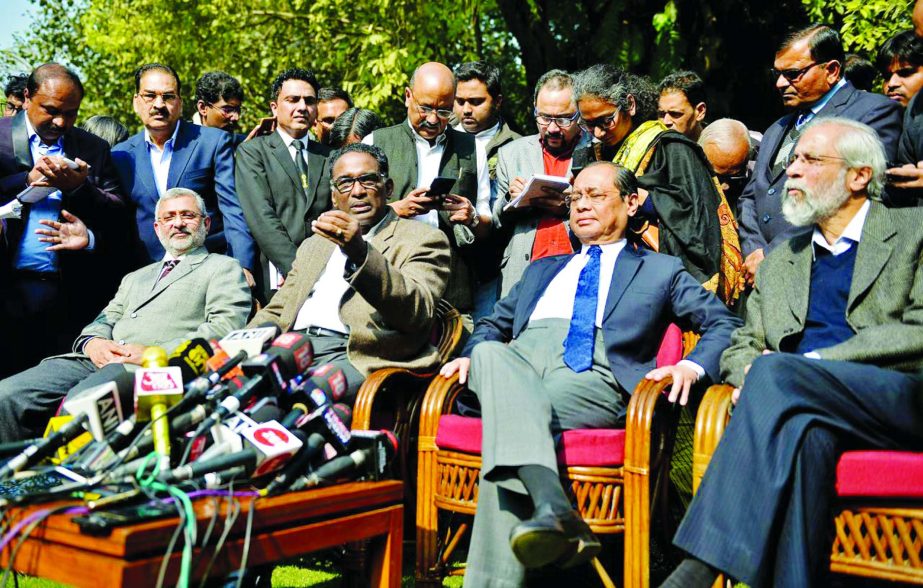
NEW DELHI (Reuters) :
Four justices of India’s top court on Friday criticized its distribution of cases to judges and raised concerns about judicial appointments, in an unprecedented public airing of problems at one of the country’s most respected institutions.
The move spells far-reaching implications for jurists and politicians in the chaotic South Asian democracy where the Supreme Court often sets the agenda on matters of policy and orders measures taken in the public interest. Exposing a rift with Chief Justice Dipak Misra, some of the Supreme Court’s most senior judges told a news conference the issues involving its administration were serious enough to prompt them to go public.
“The four of us are convinced that unless this institution is preserved and it maintains its equanimity, democracy will not survive in this country,” Justice Jasti Chelameswar said on the lawns of his residence in the Indian capital. The justices gave few details of the incidents they were referring to, but released
a letter they had written to Misra. In the letter, they mentioned instances of cases with “far-reaching consequences for the nation and the institution” that were selectively assigned by the chief justice without any rational “basis for such assignment”. All Supreme Court judges should be involved in setting the procedures used to hire and promote judges in various courts in the country, including the high courts, they added. Reuters could not immediately reach the chief justice for comment. Law Minister Ravi Shankar Prasad declined to comment.
Two close aides of Prime Minister Narendra Modi said he was looking into the matter and had summoned top law ministry officials for consultations. Some Supreme Court lawyers praised the justices’ action.
“Looking at its own flaws is the first step to correcting an institution, to deepening true constitutional democracy,” said Karuna Nundy, a Supreme Court lawyer. The Supreme Court has 25 judges appointed by India’s president, including the chief justice, and each retires at the age of 65, the court says on its website.
The four justices at Friday’s news conference – besides Chelameswar, they included Ranjan Gogoi, Madan Lokur and Kurian Joseph – are the most senior after Misra. Three of them are scheduled to retire this year, while Gogoi is in line to be the next chief justice, based on seniority. Efforts to alert the chief justice that certain things were not in order and that remedial measures were needed had failed, prompting the news conference, Chelameswar said.
Four justices of India’s top court on Friday criticized its distribution of cases to judges and raised concerns about judicial appointments, in an unprecedented public airing of problems at one of the country’s most respected institutions.
The move spells far-reaching implications for jurists and politicians in the chaotic South Asian democracy where the Supreme Court often sets the agenda on matters of policy and orders measures taken in the public interest. Exposing a rift with Chief Justice Dipak Misra, some of the Supreme Court’s most senior judges told a news conference the issues involving its administration were serious enough to prompt them to go public.
“The four of us are convinced that unless this institution is preserved and it maintains its equanimity, democracy will not survive in this country,” Justice Jasti Chelameswar said on the lawns of his residence in the Indian capital. The justices gave few details of the incidents they were referring to, but released
a letter they had written to Misra. In the letter, they mentioned instances of cases with “far-reaching consequences for the nation and the institution” that were selectively assigned by the chief justice without any rational “basis for such assignment”. All Supreme Court judges should be involved in setting the procedures used to hire and promote judges in various courts in the country, including the high courts, they added. Reuters could not immediately reach the chief justice for comment. Law Minister Ravi Shankar Prasad declined to comment.
Two close aides of Prime Minister Narendra Modi said he was looking into the matter and had summoned top law ministry officials for consultations. Some Supreme Court lawyers praised the justices’ action.
“Looking at its own flaws is the first step to correcting an institution, to deepening true constitutional democracy,” said Karuna Nundy, a Supreme Court lawyer. The Supreme Court has 25 judges appointed by India’s president, including the chief justice, and each retires at the age of 65, the court says on its website.
The four justices at Friday’s news conference – besides Chelameswar, they included Ranjan Gogoi, Madan Lokur and Kurian Joseph – are the most senior after Misra. Three of them are scheduled to retire this year, while Gogoi is in line to be the next chief justice, based on seniority. Efforts to alert the chief justice that certain things were not in order and that remedial measures were needed had failed, prompting the news conference, Chelameswar said.

